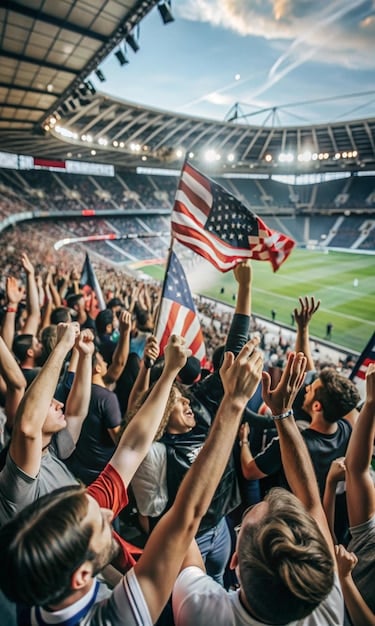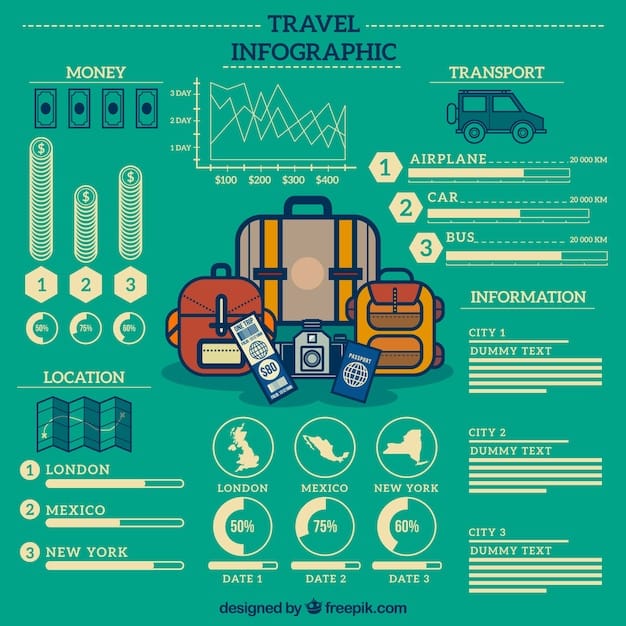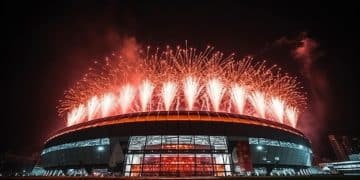US World Cup 2026 Ticket Prices: Expectation & Budget Guide

Navigating the ticketing landscape for the US World Cup 2026 demands strategic financial planning, as prices are projected to vary significantly based on match stage, venue, and seating category, requiring fans to budget for various expenses beyond the ticket itself.
The anticipation for the FIFA World Cup 2026™ is palpable, especially with matches hosted across North America, including a significant portion in the United States. For prospective attendees, understanding US World Cup 2026 ticket prices: what to expect and how to budget is paramount. This guide aims to demystify the upcoming ticketing process, offering insights into potential costs and practical budgeting strategies to ensure your World Cup experience is memorable without financial strain.
understanding the world cup ticket landscape
The FIFA World Cup is more than just a football tournament; it’s a global spectacle drawing millions of fans from every corner of the world. With the 2026 edition set to be the largest ever, featuring 48 teams and 104 matches across 16 host cities in the US, Canada, and Mexico, the demand for tickets will undoubtedly be astronomical. Understanding the typical structure of World Cup ticketing is the first step toward securing your spot. Historically, FIFA categorizes tickets into various tiers, each with its own price point tailored to different fan segments and match importance.
These categories often reflect seat location within the stadium, from prime midfield views to more distant, but equally exciting, vantage points behind the goals. Beyond that, the stage of the tournament significantly influences pricing. Group stage matches, while still highly sought after, are generally more accessible than knockout rounds, quarter-finals, semi-finals, or, of course, the grand final. Early bird registrations and various pre-sale phases, often linked to credit card partners or national football associations, have historically offered initial access before general public sales commence. This tiered approach allows for a broad spectrum of pricing, aiming to make the event accessible to various budgets while maximizing revenue. Transparency around these categories and their associated benefits will be crucial for fans planning their trip.
ticket categories and what they mean
When FIFA releases ticket information, they typically delineate several categories, each designed to offer a different experience and price point. Understanding these can help you strategize your purchase:
- Category 1: These are usually the most expensive tickets, offering prime viewing positions, often centrally located and closer to the action. Ideal for serious football aficionados.
- Category 2 & 3: These categories offer good views, typically located in corner sections or behind the goals, providing a balance between price and vantage point.
- Category 4 (Local Residents/Affordable): Often the most affordable category, sometimes reserved for residents of the host country, aimed at making the event accessible to a wider local audience.
- Accessibility Tickets: Specifically designed for fans with disabilities and their accompanying persons, these tickets ensure an inclusive experience.
Each category has a distinct price range, and knowing which one aligns with your budget and viewing preferences is key. It’s a fundamental part of planning for the financial outlay involved in attending such a monumental event.
impact of tournament stage on pricing
The progression of the tournament directly correlates with ticket prices. As the stakes get higher and the pool of teams narrows, demand intensifies, pushing prices upwards. This progression typically looks like this:
- Group Stage: The most numerous matches, offering the widest range of pricing. Attending multiple group stage games might be more feasible than a single knockout match.
- Round of 16 & Quarter-finals: Prices begin to climb as teams battle for survival. These matches often feature high-stakes encounters between formidable opponents.
- Semi-finals: Significantly more expensive, as only four teams remain, vying for a spot in the final. Demand far outstrips supply at this stage.
- Final: The pinnacle of the tournament, commanding the highest prices. This is the ultimate bucket-list item for many football fans, and prices reflect that exclusivity.
Developing a realistic budget requires deciding which stages you prioritize. A strategic approach could be to focus on group stage matches involving your favorite team or attending a specific stadium to soak in the atmosphere across several games, rather than aiming for the most expensive knockout ties.
projected ticket prices for world cup 2026
While official ticket prices for the FIFA World Cup 2026 are yet to be announced, we can make informed projections based on historical data from previous World Cups and major sporting events held in North America. The trend has consistently shown an upward trajectory in prices due to inflation, increased demand, and the overall grander scale of the event. For the 2026 edition, with 48 teams competing and more matches, the logistical scale alone suggests higher operational costs, which often translate into ticket prices.
Looking back at the FIFA World Cup Qatar 2022™ provides a recent benchmark. Group stage tickets ranged from approximately $70 for Category 4 to $220 for Category 1. Knockout matches scaled up considerably, with the final reaching around $1,600 for a prime Category 1 seat. Given that the US is a more expensive market in many regards, particularly for hospitality and travel, it’s reasonable to expect these figures to be at least at par or, more likely, higher. A realistic estimate would place group stage tickets in the range of $90-$300, with knockout rounds potentially hitting $300-$700, and the final possibly exceeding $2,000 for premium seats. These are general estimates; individual match-ups (e.g., USA vs. Brazil) or high-profile games will naturally command higher prices.
historical trends and 2026 predictions
Examining past World Cups reveals a consistent pattern of price increases. From modest prices in the early 2000s to the escalating costs of recent tournaments, the global appeal of football and the increasing professionalization of event management have played a significant role. For 2026, several factors will further influence ticket pricing:
- Inflation: General economic inflation will naturally push prices higher.
- Increased Matches & Teams: A larger tournament means more opportunities for revenue; however, the sheer volume could lead to some price diversification for earlier stages.
- Host Nation Economy: The US economy and average disposable income are higher than many previous host nations, which can support higher price points.
- Technology & Fan Experience: Investments in stadium infrastructure, advanced technology, and enhanced fan zones will contribute to overall costs.
Therefore, while general tickets will likely start around $90-$100 for basic seats in group stage matches, they could easily jump to $250-$300 for more desirable group stage seats. Round of 16 tickets might hover between $350-$650, quarter-finals from $500-$900, semi-finals from $700-$1,500, and the final could easily range from $1,000 to upwards of $2,500, especially for Category 1 tickets or hospitality packages. These are figures that potential attendees should realistically prepare for.
factors influencing specific match prices
Not all tickets for a given category and stage will be priced identically. Several dynamic factors can significantly alter the cost of attending a specific match. These variables introduce complexity but also opportunities for shrewd budgeting.
- Team Match-ups: A match between two footballing giants (e.g., Brazil vs. Argentina) or the host nation’s games will always be in higher demand and thus more expensive than a group stage match between two lower-ranked teams.
- Host City Popularity: Cities like New York/New Jersey, Los Angeles, and Miami, known for their high tourism appeal and higher cost of living, might see slightly elevated ticket prices compared to less expensive host cities.
- Time of Sale: Early bird access or initial FIFA lottery phases typically offer the base price. As these phases close, and especially on the secondary market closer to the event, prices can surge dramatically due to limited supply and heightened demand.
- Sponsorships & Hospitality: Corporate hospitality packages, which include premium seating, food, beverages, and exclusive perks, will be substantially more expensive but offer a luxurious experience. These often sell out quickly to businesses and high-net-worth individuals.
Understanding these influencers will allow fans to make informed decisions. For instance, if budget is a primary concern, targeting less popular team match-ups or earlier purchasing phases might be a more viable strategy than seeking out the most anticipated games.
how to budget for your world cup experience
Attending a World Cup involves more than just the ticket price; it’s a comprehensive travel experience that requires meticulous budgeting across various categories. A common pitfall for fans is underestimating the ancillary costs associated with such a large-scale international event. Beyond the match day, accommodation, transportation, food, and supplementary experiences all contribute significantly to the total expenditure. Planning for these elements well in advance—ideally, as soon as preliminary travel details are solidified—can avert last-minute financial stress and ensure a smoother, more enjoyable trip. This holistic approach to budgeting enables fans to allocate funds wisely, prioritizing what matters most to their individual experience while being prepared for unexpected expenses.
A detailed budget should account for the entire duration of your stay, from the moment you depart to your return. Consider the number of matches you plan to attend, the duration of your stay in each host city, and the level of comfort you desire for lodging and dining. Early bookings, particularly for flights and accommodations, can yield substantial savings, as prices tend to inflate closer to the event due to heightened demand. Additionally, researching local transportation options and average meal costs in your chosen host cities will provide a clear picture of daily expenses. Building a robust budget framework is the cornerstone of an accessible and unforgettable World Cup journey.

beyond the ticket: comprehensive cost breakdown
A comprehensive budget must include these critical components:
- Flights: This will be one of the largest expenditures, especially for international travelers. Prices vary by origin, destination, and booking time. Be prepared for peak travel surcharges.
- Accommodation: Hotel rooms, Airbnb rentals, or even hostels will see significant price surges. Booking well in advance or considering options slightly outside the immediate city center might save money.
- Local Transportation: Getting to and from stadiums, and moving around host cities, adds up. Factor in public transport passes, ride-shares, or car rentals.
- Food & Beverages: Dining out, snacks, and drinks inside and outside stadiums represent a considerable daily expense. Self-catering part of the time can help manage this.
- Merchandise & Souvenirs: Official team jerseys, scarves, and other memorabilia are part of the fan experience but come with a cost.
- Tours/Activities: If you plan to explore the host cities beyond the matches, factor in costs for sightseeing, museums, or other attractions.
- Contingency Fund: Always allocate an extra 10-15% of your total budget for unexpected expenses or emergencies.
By breaking down costs into these categories, you gain a clearer understanding of the financial commitment required and can adjust your spending plan accordingly.
saving strategies for affordability
Attending the World Cup doesn’t have to break the bank if you employ smart saving strategies:
- Book Early: This applies universally to flights, accommodation, and potentially initial ticket phases. The earlier you book, the better the chances of securing lower prices.
- Travel in Groups: Sharing accommodation and sometimes even local transportation can significantly reduce per-person costs.
- Consider Less Popular Host Cities: If you’re flexible, choosing to attend matches in cities with a lower cost of living might save on accommodation and general expenses.
- Utilize Public Transport: Whenever possible, opt for trains, buses, or subways over taxis or ride-shares, especially in congested city centers.
- Balance Dining: Mix eating at restaurants with grocery shopping and preparing some of your own meals to save on food costs.
- Look for Package Deals: Some travel agencies or official partners might offer bundled packages that include flights, hotels, and tickets, potentially at a reduced overall rate.
- Secondary Market Caution: While secondary markets might offer tickets when primary sales are closed, be extremely cautious of inflated prices and fraudulent tickets. Only use reputable platforms.
Implementing these strategies can help transform a seemingly impossible budget into a manageable one, making the dream of attending the World Cup a reality.
the ticketing process: what to expect in 2026
The journey to securing World Cup tickets is often as intricate as the tournament itself, requiring patience, quick reflexes, and a clear understanding of FIFA’s official sales phases. Historically, FIFA employs a multi-stage ticketing process designed to manage overwhelming demand and ensure fair access. This usually begins with a blind random selection draw, where fans apply for tickets without knowing if they will be successful, followed by a first-come, first-served phase. The FIFA World Cup 2026 will likely follow a similar model, albeit on an even grander scale due to the expanded format and multiple host nations. Prospective attendees should be acutely aware that official ticket sales will occur exclusively through FIFA’s dedicated ticketing portal. Relying on unauthorized third-party vendors for initial sales or inflated prices is not only discouraged but also risky, as it comes with a high potential for fraud and invalid tickets.
Being prepared means more than just having funds; it means staying informed about official announcements, understanding the different application windows, and having all necessary documentation ready. Creating a FIFA ticketing account as soon as it becomes available should be a priority. Moreover, familiarizing oneself with the various ticket types—individual match tickets, team-specific series, or venue-specific packages—will be beneficial. Each type offers different levels of flexibility and commitment. The experience from previous tournaments suggests that demand often far outstrips supply, especially for popular matches, necessitating a strategic approach rather than a hopeful one. Patience will be a virtue, but proactivity will be the key to success.
official sales phases and timelines
FIFA typically rolls out tickets in distinct phases, each with its own set of rules and deadlines:
- Sales Phase 1 (Random Selection Draw): This is usually the first opportunity to apply. Fans register interest for specific match categories or team series. A lottery then determines who gets the tickets. Payment is processed only if applications are successful.
- Sales Phase 1 (First-Come, First-Served): Immediately following the random draw, any remaining tickets from the initial allocation are sold on a first-come, first-served basis. This phase requires quick action due to high demand.
- Sales Phase 2 (Random Selection Draw & First-Come, First-Served): A similar two-step process, but often with the inclusion of specific team or venue ticket series.
- Last-Minute Sales Phase: Closer to the tournament, any remaining or returned tickets are sold. While possible to find tickets here, choices are limited, and prices may be less flexible.
Staying updated with specific dates and times for each phase via official FIFA channels is paramount. Missing a window could mean missing out entirely.
important tips for securing your tickets
To maximize your chances of success during the ticketing process, consider these tips:
- Register Early on FIFA’s Official Site: Create an account as soon as registration opens. This ensures you receive direct notifications about sales phases.
- Have Payment Ready: Ensure your credit card has sufficient funds and is valid for international transactions (if applicable). Many transactions are time-sensitive.
- Be Flexible with Match Choices: If you’re determined to attend, be open to different match days, categories, or even cities. Your chances of getting a ticket increase with flexibility.
- Understand the Application Process: Know whether you’re applying for individual matches, a team series (following a specific team), or a venue series (attending all matches at a specific stadium).
- Beware of Unauthorized Resellers: Only purchase tickets through official FIFA channels. The secondary market is rife with scams, and tickets bought from unofficial sources can be revoked without refund.
- Join Fan Clubs/Associations: Some national football federations or fan clubs might have pre-allocation schemes or provide information to members.
By diligently following these guidelines, fans can navigate the complex ticketing landscape more effectively, increasing their odds of witnessing the World Cup live.
making the most of your world cup visit
Attending the World Cup is a once-in-a-lifetime experience for many fans, and careful planning extends far beyond just securing tickets and managing finances. To truly immerse yourself in the global carnival, it’s essential to consider the broader cultural, logistical, and safety aspects of your visit. The USA offers a diverse landscape of cities, each with its unique charm and attractions, adding another layer to the World Cup experience. Beyond the roar of the stadium, exploring the local culture, understanding the layout of the host cities, and engaging with fellow fans from around the world can elevate your trip from a simple sporting event to an unforgettable cultural exchange. This requires a proactive approach to research and preparation, ensuring that every moment of your journey is optimized for enjoyment and safety.
Considering the vast distances between some host cities, efficient travel planning within the US will be crucial. This involves not only booking flights or train tickets in advance but also understanding public transportation systems upon arrival. Additionally, researching fan zones and public viewing areas, which often offer a vibrant atmosphere even without a match ticket, can enrich your experience and provide alternatives during non-match days. Thinking about mobile connectivity, international roaming, or local SIM cards will ensure you stay connected. Ultimately, a well-rounded plan ensures that you absorb the unique intersection of sport and culture that only a World Cup can offer, making memories that last a lifetime.

exploring host cities and fan zones
The 2026 World Cup offers a unique opportunity to explore multiple US cities:
- City Exploration: Research local attractions, historical sites, and culinary delights in each host city you plan to visit. Many cities will offer discounted tourist passes.
- Fan Zones: FIFA and host cities typically set up official fan zones. These are free-to-enter areas with large screens broadcasting matches, food vendors, entertainment, and a vibrant atmosphere. They are excellent alternatives for non-match days or if you don’t have a ticket for a particular game.
- Cultural Immersion: Engage with local communities and other international fans. The World Cup is a celebration of global cultures, and interacting with attendees from various backgrounds enhances the experience.
Plan your itinerary to balance match attendance with sightseeing, ensuring you get the most out of your visit to the United States.
safety and practical considerations
Ensuring your safety and being prepared for practicalities will contribute to a smooth experience:
- Travel Insurance: This is non-negotiable. Comprehensive travel insurance should cover medical emergencies, trip cancellations, and lost luggage.
- Local Laws and Customs: Familiarize yourself with US laws and cultural nuances. While generally welcoming, understanding local conduct can prevent misunderstandings.
- Health and Medical Preparedness: Carry any necessary prescriptions and have a basic first-aid kit. Know how to access medical services if needed.
- Cybersecurity: Be wary of public Wi-Fi networks for sensitive transactions. Use reputable VPNs or secure personal hotspots.
- Currency and Payments: The US uses USD. While credit cards are widely accepted, having some cash for smaller transactions is advisable. Inform your bank of your travel plans to avoid card freezes.
- Emergency Contacts: Keep a list of emergency numbers, including local police, your embassy/consulate, and immediate family members.
- Stay Hydrated and Sun Protected: Depending on the time of year and location, heat and sun can be significant factors.
Proactive preparation in these areas will allow you to relax and fully enjoy the World Cup experience with peace of mind.
what to do if tickets are sold out or too expensive
The reality for many aspiring World Cup attendees is that official tickets may sell out rapidly, or the prices might simply be out of reach. However, a sold-out official sale does not necessarily mean the end of your World Cup dream. There are alternative avenues to explore, but these require caution, due diligence, and an understanding of associated risks. The secondary market, for instance, can be a viable option for obtaining tickets, but it is also where most scams related to major events occur. Therefore, knowing how to navigate this landscape safely and legally is paramount. Furthermore, even without a match ticket, the atmosphere surrounding the World Cup is infectious, and there are numerous ways to participate in the excitement.
Embracing a comprehensive approach that includes exploring official resale platforms, considering fan zone experiences, and understanding alternative viewing options can still lead to a memorable World Cup experience. The key is to be flexible, proactive, and discerning about where and how you engage with the event. This might involve adjusting expectations from attending specific high-demand matches to simply soaking up the general ambiance in a host city, or seeking out more affordable viewing experiences. The World Cup is a global party, and there’s often a place for everyone, even if it’s not inside the stadium for every game.
navigating the secondary ticket market safely
If official channels are exhausted, the secondary market might be your next option, but proceed with extreme caution:
- Official Resale Platforms: FIFA may operate an official ticket resale platform closer to the tournament. This is the safest way to buy a resold ticket, as authenticity is guaranteed. Prioritize this option above all others.
- Reputable Resale Sites: If no official platform exists or tickets aren’t available there, use well-known and reputable resale sites (e.g., StubHub, SeatGeek, Ticketmaster Resale). Research their buyer protection policies thoroughly.
- Avoid Unverified Sellers: Be highly skeptical of social media offers, obscure websites, or individuals offering tickets without verifiable credentials. These are often scams.
- Check Ticket Attributes: If possible, verify seat numbers, section, and category before purchasing to ensure they align with what’s advertised. Authentic tickets will usually have specific barcodes or QR codes that link to unique identifiers.
- Understand Pricing: Expect prices on the secondary market to be significantly higher than face value, especially for popular matches. Compare prices across multiple reputable platforms to gauge fair value.
Purchasing from unofficial sources risks financial loss and potential denial of entry to the stadium. Due diligence is critical.
alternative ways to experience the world cup
Even without a stadium ticket, you can still be part of the World Cup excitement:
- Fan Festivals and Public Viewing Areas: Host cities will have designated fan festivals or public viewing areas with giant screens. These offer an electric atmosphere, often with live music, food, and family-friendly activities. Many fans choose this experience to watch games with others.
- Sports Bars & Restaurants: Local establishments across the country will be showing games, creating vibrant communal viewing experiences. This is a great way to enjoy matches with fellow fans without the travel and ticket costs.
- Community Screenings: Various communities and cultural centers may organize local screenings, fostering a more intimate viewing experience.
- Travel During Group Stages: Consider visiting a host city during the group stages when there are numerous matches being played. Even if you don’t attend a game, the city will be buzzing with fans, creating an exciting atmosphere.
- Volunteer Opportunities: For those on a tight budget but eager to be involved, look into volunteer programs that often offer access and behind-the-scenes experience in exchange for assistance.
These alternatives provide a fantastic way to soak in the World Cup spirit, often at a fraction of the cost of attending live matches.
| Key Point | Brief Description |
|---|---|
| 🎟️ Ticket Range | Group stage tickets projected $90-$300; Final up to $2,500+. |
| ✈️ Budget Essential | Include flights, accommodation, local transport, food, and contingency fund. |
| ✅ Buying Safely | Only purchase from FIFA’s official site or authorized resale platforms. |
| 🎉 Experience Options | Fan zones, sports bars, and city exploration offer vibrant alternatives. |
frequently asked questions
▼
Official ticket sales for the FIFA World Cup 2026 are not yet announced, but they typically begin in phases approximately 18-24 months prior to the tournament. Fans should register on FIFA’s official website for direct notifications. Keep an eye on FIFA’s announcements throughout late 2024 and early 2025 for definitive timelines.
▼
Fans can typically expect individual match tickets for single games, team-specific series (following a particular national team through the group stage), and venue-specific series (all matches at a given stadium). Hospitality packages, offering premium seating and amenities, will also be available at a higher price point.
▼
Ticket prices escalate significantly as the tournament progresses. Group stage matches are the most affordable, followed by the Round of 16, Quarter-finals, Semi-finals, and finally, the World Cup Final, which commands the highest prices due to extremely high demand and exclusivity. Plan accordingly to maximize your budget.
▼
It is strongly advised against purchasing tickets from unauthorized third-party websites or unofficial sellers. FIFA exclusively sells tickets through its official platform. Unofficial tickets carry a high risk of being fraudulent, invalid, or heavily inflated, potentially leading to denied entry and financial loss. Always use official sources.
▼
Beyond tickets, essential expenses include international and domestic flights, accommodation in host cities (hotels, rentals), local transportation (public transit, ride-shares), daily food and beverage costs, merchandise, and a vital contingency fund for unforeseen expenses. Comprehensive budgeting is key for a stress-free experience.
conclusion
Preparing for the US World Cup 2026 is a significant undertaking that extends far beyond the excitement of the match itself. Understanding the projected ticket prices, building a meticulous budget, and navigating the official ticketing process are all crucial steps for any prospective attendee. By familiarizing yourself with historical trends, recognizing the factors that influence pricing, and planning for ancillary expenses like travel and accommodation, you can significantly enhance your chances of securing tickets and enjoying a memorable experience. Even if direct stadium access proves challenging, the vibrant fan zones and widespread enthusiasm offer ample opportunities to immerse yourself in the global spectacle. The World Cup is a celebration not just of football, but of camaraderie and passion; a well-planned trip ensures you can be a part of it, creating memories that will last a lifetime.





